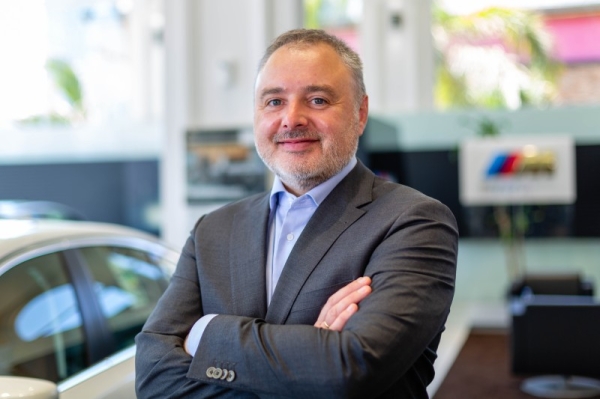RIYADH: The rapidly evolving transport sector in Saudi Arabia is set for a significant boost with the return of the EV Auto Show to Riyadh, taking place from Sept. 17 to 19.
Hosted at the Riyadh International Convention and Exhibition Center, this three-day event aligns with Saudi Arabia’s Vision 2030, emphasizing its commitment to electric vehicles and sustainable technology.
The exhibition is a central event for the Kingdom’s expanding EV ecosystem. It brings together key stakeholders, including automotive manufacturers, charging solution providers, policymakers, and consumers, to discuss the future of mobility in the region.
Attendees will have the chance to explore a variety of EVs, charging solutions, and green technologies. The show will feature interactive seminars and panel discussions, allowing participants to engage with industry experts and innovators.
As Saudi Arabia aims to manufacture and export over 150,000 electric cars by 2026, such events are vital for advancing the shift toward clean technology and sustainable energy sources.
The show also serves as a platform for knowledge exchange, focusing on advancements in battery technology, charging infrastructure, and regulatory developments.
This exchange is crucial for overcoming current challenges and accelerating the Kingdom’s transition to electric mobility.
Shift in perception
Saudi Arabia’s EV market is growing, fueled by government initiatives, public-private partnerships, and increasing consumer interest.
Ravi Ravichandran, president of Ford Middle East, told Arab News: “The electric vehicles market in Saudi Arabia is undergoing rapid expansion, largely driven by the Kingdom’s Vision 2030, which seeks to diversify the economy beyond its traditional reliance on hydrocarbons.”
He noted a rise in consumer interest in EVs, citing a recent survey that shows 40 percent of Saudi consumers are considering purchasing one within the next 12 months. This reflects a growing shift away from traditional internal combustion engine vehicles.
Among those surveyed, hybrid vehicles were the most popular choice, followed by plug-in hybrids and pure battery EVs.

Ravi Ravichandran, president of Ford Middle East. Supplied
Ravichandran added that nearly one third of Saudis are already exploring the EV market. He also highlighted that 81 percent of respondents reported an improved view of electric vehicles over the past year, with many now perceiving them as sleek, enjoyable to drive, and technologically advanced. This indicates a positive shift in public perception.
Infrastructure development
A significant challenge in promoting EV adoption is the development of a comprehensive charging infrastructure.
The Ford executive highlighted that “range anxiety” remains a significant issue for consumers who worry about the availability of charging stations for long trips or daily commutes.
To address this, he added: “The Saudi government, along with regional stakeholders, is actively working to build a robust charging network.”
Electromin is a key player in expanding the charging infrastructure across the Kingdom.
Mark Notkin, chief innovation officer at Electromin, told Arab News: “The widespread implementation of fast charging services across Riyadh hinges on several key factors including governmental incentives, EV adoption rates, regulatory approvals, and partnerships with the private sector.”
These factors will influence the timeline for making fast charging facilities widely available.
Electromin has already installed over 100 chargers across Saudi Arabia, all operated by the company and accessible via its app. The company is focusing on increasing the availability of fast charging services in high-traffic areas, including major malls in Riyadh and Jeddah.

Mark Notkin, chief innovation officer at Electromin. Supplied
Localization and talent development
An essential component of developing a sustainable EV ecosystem is the localization of talent in the infrastructure sector.
Vision 2030 is driving companies to invest in training and hiring local professionals.
Notkin said: “The localization rate of Saudi employees in the EV infrastructure sector is rising, driven by Vision 2030. Companies are increasingly training and hiring local talent in roles such as project management, marketing, and operations.”
This growing localization is expected to continue as the sector expands, contributing to job creation and fostering technological expertise in the Kingdom.
Ravichandran also highlighted the job creation potential, and said: “The expansion of EV manufacturing, charging infrastructure, and related services will generate significant new job opportunities, playing a crucial role in Saudi Arabia’s economic diversification.
“As more local talent is employed in the EV sector, this will in turn foster the transfer of advanced technologies, particularly in battery production, charging solutions, and software development.”
Creating awareness
Increasing consumer awareness about the benefits of EVs is essential for widespread adoption.
However, misconceptions continue to pose barriers. Ravichandran said: “Nearly one-third of Saudis mistakenly believe EV batteries cannot be recycled, half think EVs require routine oil changes, and one-quarter incorrectly assume that EVs still need fuel to operate.”
These misconceptions highlight the need for “targeted education to inform the public about the realities of owning and maintaining an electric vehicle.”
Efforts are underway to enhance consumer understanding of the long-term cost savings associated with EVs. “Consumers need to understand the long-term cost savings, such as reduced fuel consumption and lower maintenance expenses,” said Ravichandran, adding: “Unlike traditional internal combustion engine vehicles, EVs have fewer components to maintain, making them a more cost-effective and reliable option over time.”
Future outlook
Looking ahead, the Saudi EV market is expected to undergo significant evolution over the next five to 10 years, driven by key developments and innovations.
Ravichandran believes that a “pivotal focus will be on accelerating the rollout of advanced charging infrastructure, with particular emphasis on integrating cutting-edge technologies to enhance convenience and efficiency for customers.”
He also highlighted advancements in local manufacturing capabilities, predicting that innovations in EV production processes and materials will likely drive down costs and increase competitiveness.

























